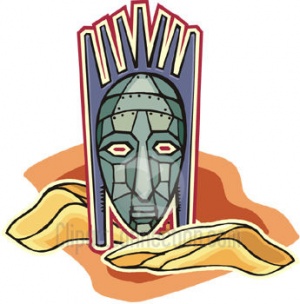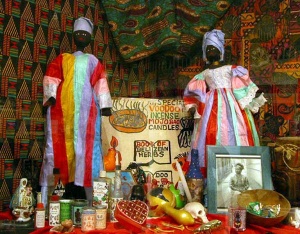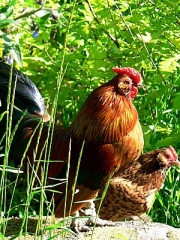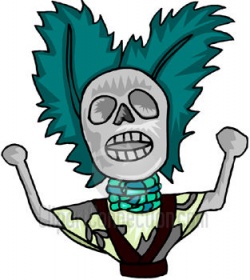Vodou
From Seminar 2: The Peopling of New York City
Sadozai Malik
Contents |
Introduction
Vodouism is a religion which has a rich and varied tradition based in a unique culture with its own moral code and social structures. Originating in Haiti and adopting traditions and customs from influences in Europe and Africa, today Vodou has found a home in the boroughs of New York. Here Haitians use the religion not only to stay connected with their family back home but also to forge a new community for themselves in a foreign land. In my research I will examine different aspects of the religion from the spirits the believe in to the rituals they perform and the impact the religion has on the West Indian community today.
History of Vodou
African and European Influences
Forged in Haiti, where it is still practiced in great numbers today, Vodouism was shaped in large part by the turbulent history of the people who practiced it. The African people adopted vodouism and as they did so, certain African cultural practices were blended into the vodou ceremonies. Once these people became slaves and were brought to the west by white colonists, they were forced to practice their beliefs in secret. It is for this reason that they merged certain catholic rituals into their own customs in order to disguise and therefore protect their religion.
Most of the spirits that came from Africa and now inhabit the culture and the customs of vodou come from the Rada cult. These spirits were born in Africa and as such tend to be benevolent and loving. The spirits that were born in Haiti after the forced immigration of African slaves are far more aggressive and sometimes quite dangerous. Catholic hymns and prayers also became part of Vodou practices. An example would be the metamorphosis of the image of the catholic Saint James into a Vodou god. The figure of Saint James, which appeared on the field of battle with a raised sword, eventually became Ogun, the Vodou spirit of war iron (Dubois 2001, p.96).
Transnationalism
As immigrants from Haiti make their way to the United States there is usually a discourse of New World and Old World beliefs. Even though they are leaving behind a part of their homes and their lives, they are also taking a part of their lives with them as they carry their culture and traditions to a new place. Most people who migrate have at least one family member who is still "back home." In this way, even though they may be thousands of miles apart they still have a connection to their roots and their customs.
One way in which many people keep their connection alive is through the practice of religion. Voudouists in particular hold close to their beliefs since it dictates so many aspects of their lives. One of the most important functions of Vodou is to garner a sense of community among a group of individuals. Never before is this more paramount than when people are away from their home and local societies. Keeping in step with religious practices not only keeps alive the connection to the people back home but also helps to establish ties to the new surroundings that you have become a part of.
Vodou Practices
Animal Sacrifices and Vodou dolls
Animal sacrifices are an integral part of the vodou culture and most ceremonies. Usually the animal sacrificed is a chicken or a rooster but on some rare occasions it is a larger animal. The purpose of an animal sacrifice is to feed the spirits. Vodouists believe that the 'lwa' (spirits) become exhausted from running the universe and the way in which they receive their nourishment and energy is from the animal sacrifices. The way in which the 'lwa' extract their energy (and in essence their life force) is from the sacrificed animal’s soul.
The belief is also held that no animal is sacrificed unnecessarily or in vain. Before the sacrificial ceremony the animal is presented with food called 'vévé' which is basically drawings made out of cornmeal. If the animal refuses to eat the food that means that the 'lwa' will not accept the offering. If however the animal does eat the food it means that the lwa approves of the sacrifice and will accept the animal’s soul as nourishment. Nearly every vodou service has an animal sacrifice and it is believed that by killing the animal one is actually releasing life into the universe.
Vodou dolls are a powerful instrument used to invoke a spirit and it is in fact a conduit to the spirit, which it was crafted in honor of. It is used as both as a sacred amulet as well as a powerful talisman. The dolls are exquisitely handcrafted and their purpose is to enhance your personal connection to the divine vodou spirits. The purpose of a vodou is not to harm living people or in some way remotely control a person’s actions.
These rituals and props help people to pass on their religion from one generation to the next. As the older parents teach their children what it means to practice Vodou, they form a sense of purpose and connection with their family and friends. The ceremonies also act as festive gatherings in which people dance, mingle and make social networks which help them in their daily lives. Immigrants from Haiti feel more at home when they know that they have a community which holds the same values as they do and understands their belief system.
Gods, Spirits and Forms of Communication
Lwa
The vodou community and vodoists in general believe that there is only one god, however they also believe that there are many ways in which to get to that god. The religion of vodou is in essence one that "serves the spirits" and these spirits are called lwa. Even though there is only one all knowing higher power, the lwa act as conduits and mediums who help those of us still on the ground in reaching a higher more enlightened plane of existence.
Anyone can be made to be a lwa upon their death through a ritual performed after their death. This ceremony is meant to reclaim the soul of the departed from the waters of the abyss. Maya Deren describes how this ritual "retains the past as ground gained, upon from which it moves forward to the future (Deren 1970, p 18)." In this way ancestors can be returned to the community and time honored traditions can be preserved.
The living do not serve the dead
It is the dead who are made to serve the living
-Excerpt from "Divine Horsemen" written by Maya Deren (1970)
Possession
In the context of Vodou possession is considered a spiritual experience during which a devotee is unified with the lwa (if only for an unconscious moment). Described by those who have experienced it as "a ride by the lwa," the possession of a member of the vodou community is a time honored tradition which carries with it certain privileges and responsibilities.
Even though possession may seem like a spontaneous release to the outsider it actually a very involved process. The devotee has to involved in numerous practices and rituals which require concentrated discipline. Possession is the focal point of the entire vodou religion and the ambition of all practitioners to experience it. If you are inexperienced or you do not have a sufficient amount of training for the process, you can experience a difficult possession.
Once you have been possessed there is a certain social status that you gain and a certain amount of respect. Since the person who is being possessed must be mature and have mastered the self, the ritual is considered completely inappropriate for children and therefore if you have been possessed it is generally accepted that you are a competent and able person.
For the "possessed", that dance is not a loss of identity, but
rather the surest way back to the self, to an identity lost,
submerged and denigrated. In the horror of the New World,
the ability to know god in oneself meant survival, which
is nothing other than the ability to keep expressing self, if
only temporarily, to a form of power that defies compromise
- excerpt from "Haiti History and the Gods" by Joan Dayan (1998)
Fet Gede Ceremony
The Fet Gede (pronounced Gay-day) ceremony is one of the most popular among vodouists. This is the Vodou ‘’Festival of the Ancestors’’. Fet mean “Festival” and Gede mean “The Sacred Dead.” This is not unlike the Halloween ceremonies that we take part in or the Mexican Day of the Dead. On this day there is dancing singing and chanting in honor of those who have passed before us and in celebration of those who will come after us. Both the past and the future are taken into consideration as members of the festival take pride and joy in the present.
As people dress up , take to the streets and dance their communion with their ancestors, they make their way to the graveyard where they feed their ancestral dead and make numerous offerings. In this way not only are the spirits placated and shown respect but also those honoring them are guaranteed their protection for the coming year. Priests and people alike come together for the festivities as sacred rituals and spiritual observances take place throughout the city.
During my interview with a practicing vodouist the Fet Gede Ceremony came up in conversation. "Oh it's an absolutely wonderful ceremony," she exclaimed "it's also one of the most popular ceremonies since the dances are the most provocative and the ceremony is one of the most involved and personal ones" she went on to describe how the Fet Gede ceremony and others like it bring a sense of unity into what would otherwise be a disjointed community.
Below is an excerpt of a Fet Gede ceremony which took place in little Haiti in Miami and is similar to the ceremonies which take place here in New York. As you can see there is loud and upbeat music being played as well as jubilant dancing. Even though you may assume that this ceremony is all about death, in actuality it is more about the celebration of life and all that it has to offer those of us still living.
Vodou in Everyday Life
How Vodou keeps Families Together
Nurturing family roots is greatly encouraged in Vodouism and family ties are constantly reinforced. Within the Vodou community the Hougan or mambo (high priest or priestess) is seen as communal parents. In this way they earn the respect and the loyalty of the entire community.They serve as a means of bringing together the people around them and garnering a feeling of kinship. After all if they all see themselves as having the same father or mother then they must in some form see each other as family as well. This respect also enforces certain moral and social codes because whoever the hougan or mambo favors benefits through a rise in social prestige and whoever he ignores bears and informal "social punishment" (Deren 1970, p 161)
Also, the religion serves as a way for people far from home to come back and visit. In Mama Lola by Karen McCarthy Brown, the author describes how Maggie, who comes from a line of priestesses, goes back to Haiti to in the summer of 1981 to be initiated with the hope that the "initiation would reinforce her bonds with her family" (Brown 1991, p 132). By returning to Haiti for initiation, not only is Maggie connected to her homeland spiritually, but culturally as well.
It also allows for an open line of communication between continents and further solidifies the need for an individual not only to remember his or her ancestor but to honor and cherish them. No matter where two family members might be or how long they had been apart, they can always find some common ground of communication when talking about the lwa.
Vodou on a Daily Basis
Vodouists believe that the lwa are present with them every moment of their lives watching over them. Which lwa you have depends a lot on you, the kind of person you have, and the kind of personality you have and thelwa has a great influence on your day to day dealings. For example in Mama Lola, Karen Brown relates the story of Alourdes who believes she is protected by Papa Ogou. Due to the fact that Wednesday is Papa Ogou's day, she refrains from doing any business or going out anywhere important unless it is a Wednesday (Brown 1991, 128).
Similarly if you have gone through a marriage ceremony in which you are ceremoniously married to a lwa, and thus ensuring that you will have his protection, you must abstain from sexual activity on whichever day of the week belongs to your lwa (Frankel 1995, p 114-115). In a financial crisis a Vodouist is known to scold or chastise the lwa and ask them for which reason he or she is being tested. They can make offerings to appease the lwa or they can rectify a wrong that they believe they might have committed to anger the gods.
Vodou in New York
The biggest and perhaps most obvious difference between the way in which New York vodouists and Haitian vodouists choose to practice their craft has to do with location. Most of the ceremonies that are conducted in New York take place in dark and dingy basements or cramped apartments in east Flatbush. In an interview i conducted, a vodouist remembers one instance in which people had to cram under a basement, which had a leaking pipe and a single rickety staircase leading out. These places are not just unsanitary but unsafe and since hundreds of people can attend any one of these rituals, potentially numerous lives are at stake.
Another time she remembered when a the mambo (female priestess) actually had to halt a ceremony and ask numerous observers to come back another time or later because there simply was not enough space to accommodate everyone. Since most ceremonies take place at several locations simultaneously she had to sugest another mambo's residence which might have been more spacious. As Bettina Schmidt points out in her article entitled “The presence of Vodou in New York” a reason for such accommodations has to do with the fact the many of the people who conduct and attend these ceremonies are illegal immigrants who feel that anonymity is of supreme importance.
Connotations
Most people do not want their neighbor to know that they practice Vodou due to the negative connotations associated with the religion so the more obscure the location the better. In Haiti there is no such negative connotation associated with practicing Vodou. In fact people are proud of their religion and freely converse about last nights ceremony or tomorrows ritual. Usually the most important and greatly regarded member of teh community is the priest and therefore when a ceremony takes place everyone knows about it and it is a big lavish event. For this reason in Haiti ceremonies are held outdoor in the open under a blanket of stars as opposed to actual blankets in someone’s underground storage room in New York.
The Role of Music
Significance
How important is music to the vodou community?
"It is paramount, all our rituals, our customs are centered around music
and it is one of the many things which allows us to connects with
the spirits on a higher plane of existence. It is an important medium".
-Excerpt of a Personal Interview with a Practicing Voudouist
Music is inherently profound to the vodou community. Not only does it help garner a sense of community among people when they partake in a ceremony but it is an actual tangible medium with which can be used to help an individual seek communication with the lwa. Any ceremony whether it is a lwa birthday, a fet gede or a possession, music is always present and playing. In a way you cannot perform a ceremony without the music because you will not be in the correct state of mind.
The music played in lwa ceremonies holds some of the same significance that gospel songs hold when people are in church and they exclaim that they can "feel the love of god." Music is powerful enough to transcend space and time and send you somewhere else.
In fact possession, one of the most sacred rituals, often occurs only after long hours of drumming and dancing. The music helps to push the devotees to the extreme to a point of exhaustion at which any conventional physical boundaries are confused or ruptured. In this way the person trying to get possessed not only lets down their gaurd physically but also emotionally allowing the spirit to inhabit their body for a short period of time.
Works Cited
Anonymous. Personal interview. 16 Apr. 2008.
Brown, Karen M. Mama Lola: a Vodou Priestess in Brooklyn. Los Angeles: University of California P, 1991.
Deren, Maya. Divine Horsemen: Voodoo Gods of Haiti. New York: Dell, 1970.
Dubois, Laurent . Vodou and History. Comparative Studies in Society and History, Vol. 43, No. 1. Jan 2001. pp. 92-100
Foner, Nancy. 2000. "From Ellis Island to JFK : New York's Two Great Waves of Immigration." New Haven: Yale University Press.
Frankel, Lory. Voodoo: Search for the Spirit. H.N. Abrams, 1995
Islands in the City: "West Indian Migration to New York." Nancy Foner, ed. New York: Columbia University Press
Schmidt, Bettina E. The Presence of Vodou in New York City: The Impact of a Caribbean Religion on the Creolization of a Metropolis. Journal for African Culture and Society. pp. 213-234(22)



